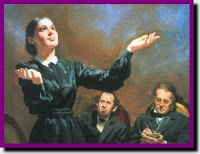Neuroscience
 This is edition number 30 of the brain science blog carnival Encephalon, and it's also my final Neurofuture post. Let's go!
This is edition number 30 of the brain science blog carnival Encephalon, and it's also my final Neurofuture post. Let's go!
Eric Michael Johnson presents Brains on Purpose illustrates a good example of inaccuracy and extrapolation in Anatomy of a telephone game applied to a neuroscience study. Research was reported in a news item, someone blogged about it, someone else write a blog post based on that blog, and…go see where it led. I don't want to add more inaccuracy by writing about the blog post about the blogging of the blog about the news based on the research article. Heh.
Paul Baxter writes an overview of Omni Brain, some chick writes about ACHOO syndrome (autosomal dominant compelling helio-ophthalmic outburst syndrome) a.k.a. photic sneeze syndrome a.k.a. sun sneezing (a.k.a. AAICS contest winner). With the single comprehensive review article that was only available in hard copy from a medical library forgotten in another city while she travels, she relies on memory, abstracts and a 1968 paper to describe the basics of this curious but common neurological syndrome. Fine, but then she wrecks it by rambling about the trigeminal nerve, migraines, horses and seasonal affective disorder when there is no empirical evidence whatsoever linking them.
"Perhaps a return to reasonable arguments based on solid evidence would be a wiser course for the future." Thank you again, Eric.
 However, since there's no solid evidence about the nature of consciousness, what is a reasonable argument? Here unreasonable is more entertaining, as vlog Channel N features a video with experts from varied disciplines spiritedly arguing Is Consciousness Definable?. (Image: Morning Consciousness (2004), Dionisio Ceballas.)
However, since there's no solid evidence about the nature of consciousness, what is a reasonable argument? Here unreasonable is more entertaining, as vlog Channel N features a video with experts from varied disciplines spiritedly arguing Is Consciousness Definable?. (Image: Morning Consciousness (2004), Dionisio Ceballas.)
The Neurocritic mocks outlandish headlines and bad neuro-journalism with A Single Gene Controls Emotional Recall! T.N. would definitely echo Eric's, "Perhaps a return to reasonable…"
Cognitive Daily reliably writes reasonable things based on solid peer-reviewed research, so when Dave Munger asks Why are Visual Memories so Vivid? the answer is conservative. He summarizes an experiment on memory of visual scenes relative to length of exposure in an article by David Melcher, Accumulation and persistence of memory for natural scenes. Journal of Vision, 6, 8-17. Melcher found that increased exposure time led to increased retention but not necessarily a long-term memory, and proposed something intermediate.
Cog Daily is also leading the development of Bloggers for Peer-Reviewed Research Reporting, now holding a logo design contest. Entries are accepted until September 10th.
The inimitable Vaughan Bell of Mind Hacks writes some compelling criticism in the post The psychology of behavior detection officers. America's latest plan to harass its airport users [my words, not Vaughan's] is based on Paul Ekman's research on facial micro-expressions. Ekman has apparently sold officials on a deception detection system despite unproven effectiveness. He concludes, "One difficulty with all deception research is that participants told to lie in the lab are not necessarily good models for 'real-life' deception, with all its complex motivations and emotional force. Lab-based lies are likely to be a poor substitute in an actual covert terrorist situation."
Alvaro Fernandez of Sharp Brains links to some newly published and newly announced research on cognitive training, in Cognitive training research: MindFit, Lumosity, Posit Science, Cogmed. As well, The Ten Habits of Highly Effective Brains is a list of actionable habits for brain fitness (with over 1200 Diggs!). I'm not exactly sure what he means by "don't outsource your brain" but have a feeling I'm doing it right now.
"Perhaps a return to reasonable arguments based on solid evidence would be a wiser course for the future." Oh yeah.
Jeremy Burman of Advances in the History of Psychology submitted five posts, which is against the Encephalon rules, but I'm not so uptight I'll insist on enforcing that. Here's My emotion-schmotions (quote from FitBuff) run a little high around this final contribution. The Neurocritic writes about The Luxury of Neurobranding, which includes a link to a post from the early days of Neurofuture. Anyone else remember the neuroword contest, a invitation to people to coin their own neuro-prefixed word describing a (potentially) new discipline in brain science? It was great fun with 50 entries, lots of chuckles and beginnings of friendships cherished to this day.
My emotion-schmotions (quote from FitBuff) run a little high around this final contribution. The Neurocritic writes about The Luxury of Neurobranding, which includes a link to a post from the early days of Neurofuture. Anyone else remember the neuroword contest, a invitation to people to coin their own neuro-prefixed word describing a (potentially) new discipline in brain science? It was great fun with 50 entries, lots of chuckles and beginnings of friendships cherished to this day.
A little unfinished business, on retiring. The winner was "neurologism: a word created by prefixing 'neuro' to almost any normal word." After announcing it, Jake Dunagan told me he'd coined the word some time before, in his paper Neuro-Futures: The Brain, Power and Politics. He asked me merely to mention his paper and solicit reader opinions. Lamely, procrastination stopped me. Please do check it out, it's an interesting hypothetical look at a future of cognitive enhancements. What do you think? (I think it's FTW, Jake.)
That, then, is all. May you all have happy neurofutures. Thanks for reading.
The next edition of Encephalon (make submissions here) is scheduled for September 10th, to be hosted by Dr. Deborah Serani.
- The Winner Is...
Wow, I'm truly impressed! 50 inspired and inspiring new neurowords were entered in the contest by 30 people. Ranging from jokiness to snarkiness to serious descriptions of science, I think a lot of them are destined to enter the lexicon. Now that...
- The Prize Winning Encephalon Of Urbana-champaign, Illinois
Better late than never, Of Two Minds hosts Encephalon.... the late prize winning February edition. Watch as Steve becomes obsessed with money, blows some lines of sugar, and throws like a girl, then turns to serotonin, brain doping, and dysfunctional...
- Snotty Or Nice?
Bhutta MF, Maxwell H. Sneezing induced by sexual ideation or orgasm: an under-reported phenomenon. J R Soc Med. 2008 Dec;101(12):587-91. We describe a hitherto under-recognized curious response in some individuals: of sneezing in response either to sexual...
- Encephalon - 4th Edition
Welcome to the Fourth Edition of Encephalon, a neuroscience blog carnival. Let's talk about psychedelics (or serotonergic agonists of the 2A/C receptor subtype). Jonathan at The Neurophile has submitted an essay on the terminology used for certain...
- Neuroplasticity On Pbs
A recent Mind Hacks post alerted me to the upcoming PBS series Brain Fitness Program, to be shown as part of the December 2007 pledge drive. From the PBS Press Release: "Dr. [Michael] Merzenich, of the University of California San Francisco, has been...
Neuroscience
Encephalon 30: The Retirement Party
 This is edition number 30 of the brain science blog carnival Encephalon, and it's also my final Neurofuture post. Let's go!
This is edition number 30 of the brain science blog carnival Encephalon, and it's also my final Neurofuture post. Let's go!Eric Michael Johnson presents Brains on Purpose illustrates a good example of inaccuracy and extrapolation in Anatomy of a telephone game applied to a neuroscience study. Research was reported in a news item, someone blogged about it, someone else write a blog post based on that blog, and…go see where it led. I don't want to add more inaccuracy by writing about the blog post about the blogging of the blog about the news based on the research article. Heh.
Paul Baxter writes an overview of Omni Brain, some chick writes about ACHOO syndrome (autosomal dominant compelling helio-ophthalmic outburst syndrome) a.k.a. photic sneeze syndrome a.k.a. sun sneezing (a.k.a. AAICS contest winner). With the single comprehensive review article that was only available in hard copy from a medical library forgotten in another city while she travels, she relies on memory, abstracts and a 1968 paper to describe the basics of this curious but common neurological syndrome. Fine, but then she wrecks it by rambling about the trigeminal nerve, migraines, horses and seasonal affective disorder when there is no empirical evidence whatsoever linking them.
"Perhaps a return to reasonable arguments based on solid evidence would be a wiser course for the future." Thank you again, Eric.
 However, since there's no solid evidence about the nature of consciousness, what is a reasonable argument? Here unreasonable is more entertaining, as vlog Channel N features a video with experts from varied disciplines spiritedly arguing Is Consciousness Definable?. (Image: Morning Consciousness (2004), Dionisio Ceballas.)
However, since there's no solid evidence about the nature of consciousness, what is a reasonable argument? Here unreasonable is more entertaining, as vlog Channel N features a video with experts from varied disciplines spiritedly arguing Is Consciousness Definable?. (Image: Morning Consciousness (2004), Dionisio Ceballas.)The Neurocritic mocks outlandish headlines and bad neuro-journalism with A Single Gene Controls Emotional Recall! T.N. would definitely echo Eric's, "Perhaps a return to reasonable…"
Cognitive Daily reliably writes reasonable things based on solid peer-reviewed research, so when Dave Munger asks Why are Visual Memories so Vivid? the answer is conservative. He summarizes an experiment on memory of visual scenes relative to length of exposure in an article by David Melcher, Accumulation and persistence of memory for natural scenes. Journal of Vision, 6, 8-17. Melcher found that increased exposure time led to increased retention but not necessarily a long-term memory, and proposed something intermediate.
Cog Daily is also leading the development of Bloggers for Peer-Reviewed Research Reporting, now holding a logo design contest. Entries are accepted until September 10th.
The inimitable Vaughan Bell of Mind Hacks writes some compelling criticism in the post The psychology of behavior detection officers. America's latest plan to harass its airport users [my words, not Vaughan's] is based on Paul Ekman's research on facial micro-expressions. Ekman has apparently sold officials on a deception detection system despite unproven effectiveness. He concludes, "One difficulty with all deception research is that participants told to lie in the lab are not necessarily good models for 'real-life' deception, with all its complex motivations and emotional force. Lab-based lies are likely to be a poor substitute in an actual covert terrorist situation."
Alvaro Fernandez of Sharp Brains links to some newly published and newly announced research on cognitive training, in Cognitive training research: MindFit, Lumosity, Posit Science, Cogmed. As well, The Ten Habits of Highly Effective Brains is a list of actionable habits for brain fitness (with over 1200 Diggs!). I'm not exactly sure what he means by "don't outsource your brain" but have a feeling I'm doing it right now.
"Perhaps a return to reasonable arguments based on solid evidence would be a wiser course for the future." Oh yeah.
Jeremy Burman of Advances in the History of Psychology submitted five posts, which is against the Encephalon rules, but I'm not so uptight I'll insist on enforcing that. Here's
 My emotion-schmotions (quote from FitBuff) run a little high around this final contribution. The Neurocritic writes about The Luxury of Neurobranding, which includes a link to a post from the early days of Neurofuture. Anyone else remember the neuroword contest, a invitation to people to coin their own neuro-prefixed word describing a (potentially) new discipline in brain science? It was great fun with 50 entries, lots of chuckles and beginnings of friendships cherished to this day.
My emotion-schmotions (quote from FitBuff) run a little high around this final contribution. The Neurocritic writes about The Luxury of Neurobranding, which includes a link to a post from the early days of Neurofuture. Anyone else remember the neuroword contest, a invitation to people to coin their own neuro-prefixed word describing a (potentially) new discipline in brain science? It was great fun with 50 entries, lots of chuckles and beginnings of friendships cherished to this day. A little unfinished business, on retiring. The winner was "neurologism: a word created by prefixing 'neuro' to almost any normal word." After announcing it, Jake Dunagan told me he'd coined the word some time before, in his paper Neuro-Futures: The Brain, Power and Politics. He asked me merely to mention his paper and solicit reader opinions. Lamely, procrastination stopped me. Please do check it out, it's an interesting hypothetical look at a future of cognitive enhancements. What do you think? (I think it's FTW, Jake.)
That, then, is all. May you all have happy neurofutures. Thanks for reading.
The next edition of Encephalon (make submissions here) is scheduled for September 10th, to be hosted by Dr. Deborah Serani.
- The Winner Is...
Wow, I'm truly impressed! 50 inspired and inspiring new neurowords were entered in the contest by 30 people. Ranging from jokiness to snarkiness to serious descriptions of science, I think a lot of them are destined to enter the lexicon. Now that...
- The Prize Winning Encephalon Of Urbana-champaign, Illinois
Better late than never, Of Two Minds hosts Encephalon.... the late prize winning February edition. Watch as Steve becomes obsessed with money, blows some lines of sugar, and throws like a girl, then turns to serotonin, brain doping, and dysfunctional...
- Snotty Or Nice?
Bhutta MF, Maxwell H. Sneezing induced by sexual ideation or orgasm: an under-reported phenomenon. J R Soc Med. 2008 Dec;101(12):587-91. We describe a hitherto under-recognized curious response in some individuals: of sneezing in response either to sexual...
- Encephalon - 4th Edition
Welcome to the Fourth Edition of Encephalon, a neuroscience blog carnival. Let's talk about psychedelics (or serotonergic agonists of the 2A/C receptor subtype). Jonathan at The Neurophile has submitted an essay on the terminology used for certain...
- Neuroplasticity On Pbs
A recent Mind Hacks post alerted me to the upcoming PBS series Brain Fitness Program, to be shown as part of the December 2007 pledge drive. From the PBS Press Release: "Dr. [Michael] Merzenich, of the University of California San Francisco, has been...
